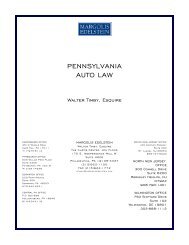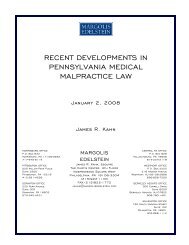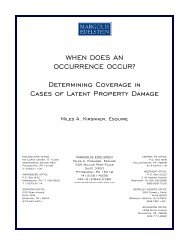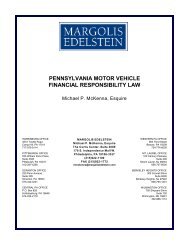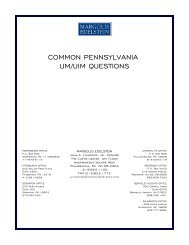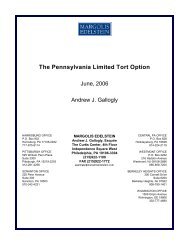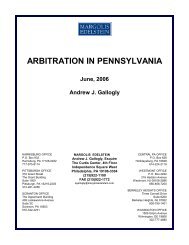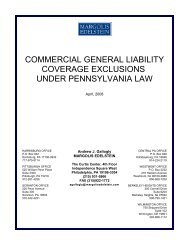selected topics in pennsylvania legal malpractice law - Margolis ...
selected topics in pennsylvania legal malpractice law - Margolis ...
selected topics in pennsylvania legal malpractice law - Margolis ...
You also want an ePaper? Increase the reach of your titles
YUMPU automatically turns print PDFs into web optimized ePapers that Google loves.
orig<strong>in</strong>al action. An action should not lie aga<strong>in</strong>st an attorney for <strong>malpractice</strong> based<br />
on negligence and/or contract pr<strong>in</strong>ciples when that client has agreed to a settlement.<br />
Rather, only cases of fraud should be actionable.<br />
In expla<strong>in</strong><strong>in</strong>g its hold<strong>in</strong>g, the Court was concerned that “[l]awyers would be reluctant to<br />
settle a case for fear some enterpris<strong>in</strong>g attorney represent<strong>in</strong>g a disgruntled client will f<strong>in</strong>d a way to<br />
sue them for someth<strong>in</strong>g that ‘could have been done, but was not’”. The hold<strong>in</strong>g <strong>in</strong> Muhammad<br />
“bars litigants who have entered a settlement agreement from subsequently ma<strong>in</strong>ta<strong>in</strong><strong>in</strong>g a suit aga<strong>in</strong>st<br />
their attorney for <strong>legal</strong> <strong>malpractice</strong>, unless fraud is alleged <strong>in</strong> the <strong>in</strong>ducement of the agreement”<br />
Accord, Piluso v. Cohen, 764 A.2d 549 (Pa. Super. 2000).<br />
However, where an attorney gives <strong>in</strong>appropriate advise regard<strong>in</strong>g the effect of a settlement<br />
on rema<strong>in</strong><strong>in</strong>g claims, the hold<strong>in</strong>g <strong>in</strong> Muhammad does not bar an action by client who claims to be<br />
adversely affected. Collas v. Garnick, 624 A.2d 117 (Pa Super 1993). In Collas, the pla<strong>in</strong>tiff asked<br />
her <strong>law</strong>yer for specific advice as to whether the execution of a general release would have any<br />
impact upon her plan to sue the manufacturer of the vehicle <strong>in</strong> which she had been rid<strong>in</strong>g, or any<br />
other tortfeasor. Her <strong>law</strong>yer <strong>in</strong>correctly assured her that a viable cause of action would lie aga<strong>in</strong>st<br />
the designer and manufacturer despite the release, and this was allowed to be the basis of a<br />
<strong>malpractice</strong> action.<br />
Further, an attorney has a duty to expla<strong>in</strong> the effect of a release to his client and can be liable<br />
to the client who relies to his detriment upon <strong>in</strong>correct advice of the attorney as to the terms of the<br />
settlement. McMahon v. Shea, 547 Pa.124, 688 A. 2d 1179 (1997). This case limited the<br />
application of Muhammad to cases where the amount of the settlement was claimed to be <strong>in</strong>adequate.<br />
When a client claims that the terms and conditions of a settlement were not expla<strong>in</strong>ed or <strong>in</strong>correct<br />
advice was given by the attorney the action is not barred.<br />
The Superior Court <strong>in</strong> White v. Kreithen, 435 Pa. Super.115, 644 A.2d 1262 (1994) decl<strong>in</strong>ed<br />
to allow a attorney who was <strong>in</strong>volved prior to settlement to plead a defense under Muhammad. In<br />
this case the client discharged her attorney and later settled the case for what was claimed to be an<br />
<strong>in</strong>adequate amount due to the negligence of the first attorney. The first attorney was not entitled to<br />
the protection under Muhammad. Nor can the second attorney be properly jo<strong>in</strong>ed to the action by<br />
the first attorney. Goodman v. Kotzen, 436 Pa. Super. 71, 647 A. 2d 247 (1994).<br />
STANDARD OF CARE<br />
The basic standard of care for an attorney <strong>in</strong> Pennsylvania is stated <strong>in</strong> Enterl<strong>in</strong>e v. Miller,<br />
27 Pa. Super. 463 (1905):<br />
An attorney is not liable to his client for a failure to succeed, unless this is<br />
due to his mismanagement of the bus<strong>in</strong>ess <strong>in</strong>trusted to him, through bad faith,<br />
<strong>in</strong>attention or want of professional skill. Without discuss<strong>in</strong>g at length the degree of<br />
skill and care required of an attorney, it is sufficient for the purpose of the case <strong>in</strong><br />
hand to say that he must, at least , be familiar with the well settled pr<strong>in</strong>ciples of <strong>law</strong><br />
-13-



